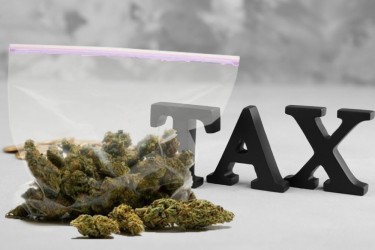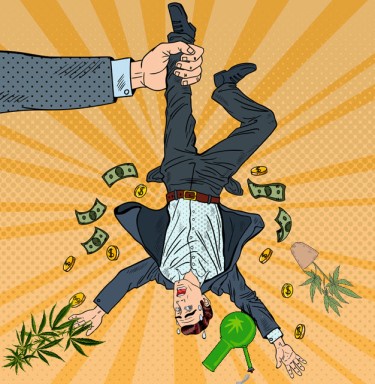Cannabis News
Cannabis May Be Moved to a Schedule 3 Drug
Published
1 year agoon
By
admin

Cannabis to Schedule 3? Who are the Winners, the Whiners, and the Losers?
It has been over a week so how do you feel about the possible move coming for marijuana to go from a Schedule 1 drug to a Schedule 3 drug on the CSA?
The industry has been volleying opinions back and forth so I won’t bore you with the “it’s great, it’s not great” debate, you can read that stuf pretty much all over, including a nice piece by Cannabis Tech as they talked to 19 cannabis leaders about the HHS recommendation here. Cannabis.net also had a legacy stoner write up his opinion on the change and what it means in a piece called, “Lipstick on a Pig”.
In case you aren’t an avid follower of the weed industry or have been off the grid for a few weeks, let me update you on the big cannabis news. The Department of Health and Human Services has formally recommended that the Drug Enforcement Administration (DEA) reduce federal restrictions on marijuana despite its continued federal illegality. However, 40 states permit its use to varying degrees.
This action comes after President Joe Biden’s order to the leading health organization to carry out a thorough assessment of marijuana, which was given 11 months ago. The HHS recommends moving cannabis from being classified as a Schedule I drug to a Schedule III drug under the Controlled Substances Act.
According to the DEA, cannabis is classified alongside other Schedule I substances, such as heroin and LSD. This classification implies a perceived high potential for abuse and a lack of recognized medical utility.
If this recommendation became law, it would mark a huge and fundamental divergence from cannabis’s existing classification as a Schedule I drug. This categorization would change how people view marijuana by separating it from high-risk substances like heroin and recognizing its possible medical uses.
The HHS Recommendation to Reschedule
An HHS spokesperson conveyed that they promptly responded to the directive by submitting their recommendation to the DEA on August 29th.
Assistant Secretary for Health Rachel Levine stated that her recommendation was grounded in a thorough review by the Food and Drug Administration regarding the classification of marijuana. This review had been pledged following President Biden’s October pardon of federal offenses related to simple possession. At that time, President Biden tasked the HHS secretary and the U.S. Attorney General with assessing the federal scheduling of marijuana.
Cannabis would significantly change if the DEA reclassified it as a Schedule III substance, including the elimination of an IRS provision that forbade drug traffickers from deducting their business expenditures from their taxes (280E as it is so affectionately known as in the cannabis industry). The marijuana sector might be able to save hundreds of millions of dollars annually because of this change. According to NBC News, small business owners have stated that their inability to deduct what are normally thought of as regular business expenses is their biggest financial difficulty.
Now that HHS has made its recommendation, all attention is on the DEA, which holds the ultimate authority over substance scheduling. The DEA, not a historical fan of cannabis, could take years to review and make a decision.
According to five sources familiar with the planning, the Biden administration had aimed to announce the drug’s rescheduling in the Fall to coincide with the election cycle in 2024, approximately a year after the president’s request for the review. The duration of the DEA’s public review process remains uncertain at this point.
In response to inquiries, a DEA spokesperson confirmed, “We can confirm DEA received a letter from the Department of Health and Human Services providing its findings and recommendation on marijuana scheduling, pursuant to President Biden’s request for a review.” The spokesperson also stated, “DEA will now initiate its review.”
When questioned about the recommendation during a news briefing on Wednesday, White House press secretary Karine Jean-Pierre emphasized that the review is an independent process led by HHS and the Department of Justice. She declined to comment on President Biden’s current stance on the federal decriminalization of marijuana.
Response/Reactions to The Recommendation
The response to the HHS recommendation has garnered strong support within the corridors of Capitol Hill. In a statement, Senate Majority Leader Chuck Schumer commended HHS for taking a decisive step in the right direction. He urged the DEA to swiftly follow suit, emphasizing the importance of this move in significantly reducing the harm caused by stringent marijuana laws. Senator Schumer, a Democrat from New York, stressed that there remains a considerable legislative agenda to dismantle the federal cannabis prohibition and roll back the War on Drugs.
Advocates of marijuana legalization perceive this initial action as a momentous milestone. It signifies the federal government’s formal recognition of cannabis’s medical contributions for the very first time.
The Cannabis Industry Association emphasized the necessity of further harmonizing federal law with states where marijuana is legal while acknowledging the historical significance of the suggested reclassification. According to CEO Aaron Smith, delisting cannabis from the Controlled Substances Act and regulating it similarly to alcohol will ultimately address the complex issues arising from the federal-state conflict.
As both political parties look to use this issue as a political wedge in the run-up to the 2024 presidential election, relaxing federal marijuana laws also has political relevance. The majority of Americans support legalization, according to polls taken year over year since 2016.
Reps. Matt Gaetz, Greg Steube, and Brian Mast, all Republicans from Florida, have openly advocated for the drug to be rescheduled and urged the Biden administration to prioritize the endeavor. Although Florida voters legalized medicinal marijuana usage last year, Florida Governor Ron DeSantis has stepped up his opposition to decriminalizing and legalizing marijuana on the presidential campaign trail this week. The Florida Supreme Court is debating whether a ballot measure legalizing marijuana will appear in 2024.
Additionally, there is a bipartisan initiative underway in Congress aimed at simplifying the provision of banking services to legitimate cannabis businesses.
Senator Schumer has emphasized that passing the SAFE Banking Act, as it’s known, will be of utmost importance when the Senate reconvenes in September. However, the potential for a government shutdown could pose challenges to this object bill’s proponents of the bill to resolve a deadlock that emerged concerning the August recess.
One of the primary reasons why cannabis enterprises continue to struggle with limited access to financial services, obstacles in conducting medical research, and restrictions on the interstate transportation of products approved for medical use in numerous U.S. states is the current Schedule I classification of marijuana. Despite the widespread acceptance of medical marijuana, only the FDA possesses the legal authority to approve medications for medical use throughout the United States.
Bottom Line – Who are the Winners, the Whiners, and the Losers?
Winners – The cannabis industry in general, the black market, and MSOs. One, regardless of what you think schedule 3 will ultimately mean, pharma taking over the whole industry or not, it is better than a schedule 1 drug, period. If you are a conspiracy theorist and believe this is Big Pharma’s move to control prescriptions and the industry, so be it, time will tell, but getting cannabis off the “spend the rest of your life in prison” drug list, is the #1 win of the whole thing, let the chips fall where they may in the future. This writer does not feel this is the trojan horse some have made it out to be and Big Pharma will rule cannabis forever going forward. 3 < 1, win!
The second biggest winners, and a groan will go out from all the legacy cannabis people, the MSOs, or multistate operators will be BIG financial winners in this one. Basically, the bigger your expenses and operation, the more damage 280E and the inability to write off any of those expenses, did to your bottom line. If you reverse that same equation and take 280E off those financial statements, all those expenses now become tax write-offs, saving the MSO hundreds of millions of dollars in tax credit or refunds. We caught wind of this strategy at the Benzinga Cannabis Conference where it was mentioned that none of the MSOs were actually paying the taxes, they were kicking the can down the road hoping for a descheduling or rescheduling of the drug. Once that happened, they could go to court and say they should have never paid those taxes in the first place as cannabis is no longer a schedule 1 drug, and at this point, that bat bleep crazy strategy actually worked! MJ BIZ picked up on this same theme recently in their article on the cash windfall coming to companies for the 280E tax classification change.
Third place winner, the black or illicit cannabis market. While already booming in the US and around the world, any instance of lessening of the punishment for getting caught selling or shipping cannabis will only encourage more aggressive business behavior. For example, if you get caught shipping 20lbs of a schedule 1 drug from California to New York, you were looking at life in jail. If that changes to a fine or something much less severe, you remove a disincentive, in economic terms, to not take an action. Hence, the opposite is true, you created more of an incentive to take chances, push the limits to get more profit because the punishment for getting caught will be much less severe. (Schedule 3 illegal drug shipment compared to a Schedule 1). The illicit market should sleep well at night if this change is made because the possible punishment for growing weed without a license and selling it out of your van or shipping it over the internet will not be much less than any time since 1952. There is now economic inventive for the illicit market to push the limits on growing, sending, and pricing, as getting caught “won’t be so bad” in historical perspective.
Fourth Place Winner – International Markets – UN drug treaties be damned as Canada and Colombia have already shown the world, as they have been shipping cannabis internationally for months if not years now, but any change to the “severity of US listings of the drug”, will only increase risk from companies in other countries to push the boundaries of international and US law. Anything that dissipates the sting of that law will only encourage more business aggression in shipping and growing cannabis. Similar to the black-market argument above, if the fines and repercussions are lessened by the US and the UN, you are inviting more risk and aggressive behavior to try and make a profit.
Honorable Mention Winner – The rumor and speculation mill. Ever since the announcement by the HHS, the rumor mill about what could happen, secret plans, what it really means, wake up people, don’t get fooled, happiest day of my life, stuff is going off the rails. One rumor is that it will only apply to medical marijuana and recreational will still be a schedule 1 drug. Hard to do since THC is the actual cannabinoid on the Schedule 1 list, so lowering it to schedule 3 would affect both recreational and medical. The biggest rumor is the cannabis industry will be place in the hands of the FDA and Big Pharma like we all feared from day #1 and all the local growers and providers will be shut out of the industry. Fat chance. They have been trying to shut down illegal cannabis since 1952, no luck, now legal in over 40 states in some form or another. Don’t count of the FDA and DEA hiring thousands of agents to try and snuff out state-legal cannabis operations and public companies.
Losers – It is hard to find a loser when you go from a schedule 1 to a schedule 3 drug without going into fear mongering about the FDA and Big Pharma. In general, MSOs are going to have way more cash and profits, so that won’t bode well for smaller companies trying to compete with the big boys. Those that want cannabis descheduled will hoot and holler, but that was never really a viable option. You aren’t going from “schedule 1 like cocaine and heroin” to “unscheduled like peanut butter” overnight. Cannabis does pass through the blood-brain barrier and get you high, it does impair your senses and alter your thoughts and concept of reality for a bit while using it, so descheduling, while sounding nice, was never really on the table unfortunately.
Interstate commerce is the next massive shoe to drop, so not sure how Schedule 3 will affect those companies that had to “silo” their whole operation in each state, having to go from seed to sale and production in each state they enter. If interstate commerce is opened up, then the industry will finally start to reach a state of economic equilibrium as you will know the price of a Snoop Leaf or Chong’s Choice blunt in California and Massachusetts. You will also know the fair price of a pound of Emerald Triangle legal weed vs a pound of Emerald Triangle illegal weed.
Whiners – The cannabis industry proletariat that are screaming “rescheduling is not enough, we need descheduling!”. These are the same people that say, “cannabis isn’t a drug, it’s a plant”. First off, almost all drugs come from plants or did in their infancy. Nicotine, caffeine, heroin, cocaine, and opium all “come from plants” and they are clearly drugs, so yes, cannabis is a plant and a drug. Its cannabinoids pass through the blood-brain barrier and get you high, it is a drug and plant, move on.
The words “don’t settle for rescheduling” have been part of many op-ed pieces about the HHS news, and for some reason, these people think the US government and the cannabis industry are some sort of equal parties or in negotiations about this subject. As Binder says in the Breakfast Club movie, “Not even close, bud!”. The word “settle” implies some sort of negotiations or bartering of the details, which is just not the case in the US government vs the marijuana industry. There are no negotiations or evidence the US government gives one iota what the marijuana industry wants, so to say “don’t settle” is a bit rich. It is like being at your sentencing in front of judge where you get 2 years in jail and saying, “I won’t settle for that, I want less!”. Umm, yeah, it doesn’t work that way, the US government is the judge, and they decide the status of cannabis based on voters and future election results that the present party in office is worried about, not what the marijuana industry wants to see.
What if we all decide “not to settle for Schedule 3”? Now what? Oh yeah, nothing we can do since as a group we have very limited power and influence in politics. The industry is an outlier, we have cut lobbying money down to the bare bones in DC, no one of influence cares what we want or think, they are looking out for votes and power-broker money, think about what Big Tobacco and Big Pharma want, that is what is on their minds as they write the big checks in DC.
It isn’t up to us to settle; we sound like bratty little kids who just got their first dinner in months and are complaining it didn’t come with a dinner roll and desert. Take the Schedule 3 W when and if it comes and live to fight another day. Win the battle and keep fighting the war.
MORE ON A POSSIBLE SCHEDULE 3 MOVE, READ ON…
You may like
-


280E Tax Code Restrictions on Cannabis Companies Forever?- GOP Senators File Bill to Keep 280E No Matter What Happnes to Weed
-


Karma Koala Podcast 232: Taylor Loyden – Terrapin Legal, Managing Attorney – Psychedelics Will Change The Law But It’ll Be Glacial
-


Marijuana company involved in Missouri’s huge recall loses final license appeal
-


New Blueberry weed strains are about to make a wave
-


Not A Hopeless Case, If You Medicate with Cannabis
-


Could 2025 be the year of university and cannabis industry partnerships?
Cannabis News
280E Tax Code Restrictions on Cannabis Companies Forever?- GOP Senators File Bill to Keep 280E No Matter What Happnes to Weed
Published
1 day agoon
February 22, 2025By
admin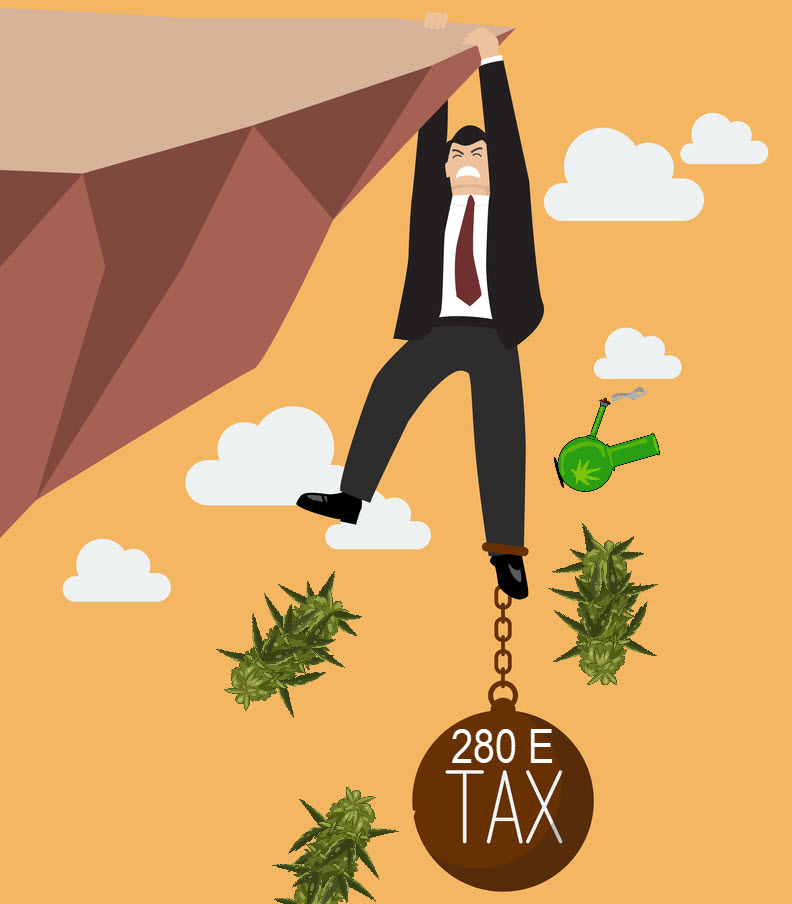
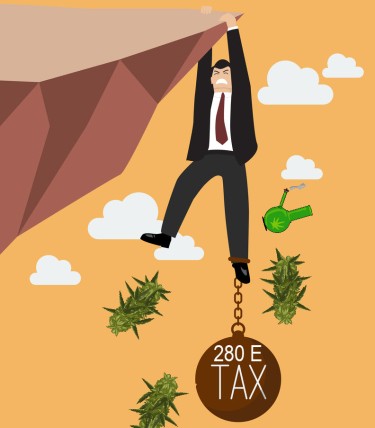
In a move that has sparked significant controversy within the cannabis industry and among reform advocates, Republican Senators James Lankford (Oklahoma) and Pete Ricketts (Nebraska) have introduced a bill that seeks to permanently enforce the tax penalties imposed on cannabis businesses under Section 280E of the Internal Revenue Code. The legislation, titled the “No Deductions for Marijuana Businesses Act,” was filed on February 7, 2025, and aims to ensure that marijuana operators remain unable to deduct standard business expenses, even if marijuana is rescheduled under federal law.
The proposal comes at a time when cannabis reform advocates have been pushing for fairer tax policies and greater federal recognition of the legal cannabis industry. However, this bill represents a significant obstacle to those efforts, as it would effectively maintain one of the most burdensome financial restrictions on cannabis businesses indefinitely. This article explores the implications of the proposed legislation, its potential impact on the cannabis industry, and the broader context of federal marijuana policy reform.
What Is Section 280E?
Section 280E of the Internal Revenue Code is a decades-old provision that has long been a thorn in the side of legal cannabis operators. Enacted in 1982 during the height of the War on Drugs, Section 280E prevents businesses involved in trafficking Schedule I or II controlled substances from deducting ordinary and necessary business expenses from their taxable income. This includes expenses such as rent, payroll, utilities, advertising, and other operational costs.
The provision was originally designed to target illegal drug dealers but has since been applied to state-legal cannabis businesses due to marijuana’s classification as a Schedule I drug under the Controlled Substances Act (CSA). As a result, cannabis operators are subject to significantly higher effective tax rates compared to businesses in other industries. In some cases, these tax rates can reach as high as 70% to 90%, leaving many cannabis companies struggling to stay afloat despite generating substantial revenue.
For years, cannabis advocates have argued that Section 280E is outdated and unfairly penalizes businesses that operate legally under state laws. They contend that removing or modifying this provision would allow cannabis companies to reinvest in their operations, create jobs, and contribute more effectively to local economies.
The “No Deductions for Marijuana Businesses Act”
The bill introduced by Senators Lankford and Ricketts seeks to cement Section 280E’s application to cannabis businesses permanently. Specifically, it would ensure that even if marijuana is rescheduled from its current classification as a Schedule I drug—something reform advocates have been pushing for—cannabis operators would still be barred from deducting standard business expenses.
In a statement accompanying the bill’s introduction, Senator Lankford said:
”Marijuana doesn’t make our families stronger, our streets safer, or our workplaces more productive. Businesses that sell federally illegal drugs—including marijuana businesses—shouldn’t get federal tax breaks.”
Senator Ricketts echoed this sentiment, emphasizing his opposition to what he described as efforts to “normalize” marijuana use:
”We cannot allow federal tax policy to subsidize an industry that poses serious risks to public health and safety.”
The bill reflects a broader ideological stance among certain Republican lawmakers who remain staunchly opposed to cannabis legalization at both the state and federal levels. By targeting one of the key financial incentives for rescheduling or descheduling marijuana—namely, relief from Section 280E’s tax penalties—the legislation seeks to undermine efforts to legitimize the industry.
Implications for Cannabis Businesses
If enacted, the “No Deductions for Marijuana Businesses Act” would deal a significant blow to cannabis operators already grappling with high taxes and regulatory challenges. Many in the industry were hopeful that rescheduling marijuana—such as moving it from Schedule I to Schedule III under the CSA—would alleviate some of these burdens by rendering Section 280E inapplicable. However, this bill would ensure that those hopes are dashed.
Financial Strain on Operators
The inability to deduct ordinary business expenses means that cannabis companies are taxed on their gross income rather than their net income. This creates an unsustainable financial model for many operators, particularly small and medium-sized businesses that lack access to traditional banking services or capital due to federal prohibition.
For example:
A dispensary with $1 million in revenue might incur $800,000 in operating expenses. Under normal tax rules, it would pay taxes on $200,000 in profit. However, because of Section 280E, it must pay taxes on the full $1 million in revenue. With effective tax rates often exceeding 70%, this leaves little room for reinvestment or growth—and in some cases leads to insolvency.
By keeping these restrictions permanently intact, Lankford and Ricketts’ bill could exacerbate existing disparities within the industry. Larger multi-state operators (MSOs) with significant resources may be able to weather these challenges better than smaller independent businesses or social equity applicants seeking entry into the market.
Impact on State-Legal Markets
The financial strain imposed by Section 280E also has broader implications for state-legal cannabis markets. High taxes and operating costs make it difficult for legal businesses to compete with illicit operators who do not face similar financial constraints. This undermines one of the primary goals of legalization: reducing the size of the illegal market.
According to Beau Whitney, Chief Economist at Whitney Economics:
”Maintaining 280E restrictions will only perpetuate an uneven playing field where illicit operators thrive while legal businesses struggle.”
States that rely on tax revenue from legal cannabis sales could also feel the impact. If legal operators are forced out of business due to unsustainable tax policies, states could see declines in revenue earmarked for education, healthcare, infrastructure projects, and other public services funded by cannabis taxes.
Opposition From Advocates and Industry Leaders
The introduction of this bill has drawn sharp criticism from cannabis advocates and industry leaders who view it as a regressive step that ignores both economic realities and shifting public opinion on marijuana legalization.
Advocacy Groups Speak Out
Organizations such as the National Cannabis Industry Association (NCIA) and Marijuana Policy Project (MPP) have condemned Lankford and Ricketts’ proposal. In a statement released shortly after the bill’s introduction, NCIA Executive Director Aaron Smith said:
”This legislation represents an outdated approach rooted in stigma rather than science or common sense. It unfairly targets an industry that Is creating jobs, generating tax revenue, and providing safe access for millions of Americans.”
Similarly, MPP’s Deputy Director Matthew Schweich argued:
”Punitive tax policies like 280E only serve to bolster the illicit market while undermining legitimate businesses trying to operate within state laws.”
Industry Leaders React
Cannabis business owners have also voiced their concerns about how this legislation could impact their operations. Many argue that fair tax treatment is essential not only for their survival but also for fostering innovation and competition within the industry.
Kim Rivers, CEO of Trulieve Cannabis Corp., stated: ”The legal cannabis industry has proven its value time and again through job creation and community investment. Policies like this threaten all of that progress.”
Broader Context: Federal Rescheduling Efforts
The timing of this bill is particularly notable given ongoing discussions about rescheduling marijuana at the federal level. In late 2023, President Joe Biden directed federal agencies—including the Department of Health and Human Services (HHS) and Drug Enforcement Administration (DEA)—to review marijuana’s classification under the CSA. HHS subsequently recommended moving marijuana from Schedule I (the most restrictive category) to Schedule III.
Rescheduling marijuana would represent a significant shift in federal policy by acknowledging its medical value while reducing some regulatory barriers. However, it would not legalize marijuana outright or address issues like banking access or interstate commerce.
Advocates had hoped that rescheduling would also eliminate Section 280E’s application to cannabis businesses—a key incentive for reform efforts. By introducing legislation specifically designed to preserve these tax penalties regardless of rescheduling outcomes, Lankford and Ricketts are effectively preempting one of the potential benefits of reform.
Conclusion
The “No Deductions for Marijuana Businesses Act” introduced by Senators James Lankford and Pete Ricketts represents a significant challenge for advocates seeking fairer treatment for legal cannabis operators under federal law. By aiming to keep Section 280E’s tax penalties permanently intact—even if marijuana is rescheduled—the bill threatens to undermine progress toward legitimizing an industry that has already faced numerous obstacles. While proponents argue that such measures are necessary to prevent “subsidizing” an industry they oppose on moral grounds, critics contend that maintaining punitive tax policies will only harm legitimate businesses while empowering illicit markets.
As debates over federal marijuana policy continue—including discussions around rescheduling—it remains crucial for stakeholders within the cannabis industry to mobilize against regressive measures like this one. The future of America’s rapidly evolving relationship with cannabis hangs in the balance—and decisions made now will shape its trajectory for years to come.
MORE ON 280E, IT KILLS CANNABIS, READ ON…
Cannabis News
Not A Hopeless Case, If You Medicate with Cannabis
Published
2 days agoon
February 21, 2025By
admin

Late-Stage Dementia: Not A Hopeless Case, If You Medicate With Marijuana
Late-stage dementia refers to the end or final stage of cognitive decline associated with dementia.
During this stage, patients go through severe memory loss and significant impairment of cognitive function, which affects communication and language abilities, memory, judgment, and reasoning. Patients in late-stage dementia are typically disoriented, impaired, and incontinent – thus, are completely dependent on their caregivers. Physically, the body goes through extreme weight loss and is much more prone to infections and bedsores among other symptoms.
Unfortunately, once one has reached the final stage of dementia, there is no known cure. Caregiving or management is typically focused on improving ones’ quality of life instead of treating the condition.
However, it seems that cannabis might be able to help.
The Case For Using CBD
A 2023 study from Greece involved researchers administering a CBD tincture on dementia patients revealed some incredible results. The findings, which were published in the medical journal, Clinical Gerontologist, found the administration of 3% CBD tinctures to be safe and effective for treating both psychological and behavioral symptoms associated with dementia.
A group of 20 patients were involved; 10 of them were given CBD for a period of 6 months and the other half underwent conventional dementia treatment. “The follow-up assessment… showed significant improvement of BPSD [behavioral and psychological symptoms of dementia] in all our patients who received CBD, and no or limited improvement in the second group, regardless of the underlying neuropathology of dementia,” they said.
“We suggest that CBD may be a more effective and safe choice for managing BPSD than the typical intervention,” the investigators concluded. “Healthcare professionals should consider incorporating it into their practices to reduce BPSD in PwD [people with dementia]… Future large and randomized clinical trials are needed to reassure these findings,” they said.
Another study from 2022 found positive results from using CBD extracts, but this time for reducing agitation caused by dementia. Agitation as well as aggression are some of the more distressing symptoms of dementia, which can manifest in different ways including physical violence, verbal outbursts, pacing, and restlessness. While there is no one standard cure for it, it’s believed that this behavior can be caused by the progressive brain cell damage associated with dementia, which makes it difficult for patients to understand and interpret their environment.
The study from Israel involved researchers administering plant-based CBD extracts with a 30:1 ration of CBD to THC on a cohort of senior dementia patients with a mean age of 79.
“Patients in the investigational group experienced a significantly greater reduction in sleep disturbances, and in agitation and aggression sub-score using two different measurement tools. The improvements were accompanied with non-serious side effects,” said the authors. “We recommend conducting a large scale randomized controlled trial on behavioral disturbances related to dementia and to compare clinical sub-types of dementia,” they reported.
THC Studies
Meanwhile, there have been other studies that have found success in treating the symptoms of dementia with THC. In 2023, a case study conducted by researchers from the Tulane University School of Medicine together with investigators at the University of Texas discussed the findings of using a high-THC tincture on an 85-year old patient with dementia.
The participant’s dementia symptoms gradually became worse over time, and wasn’t responding to medications. However, after administering the THC medicine, they found that the “patient’s behavior rapidly improved” and the marked benefits were so significant that the patient was discharged from a treatment facility to home care.
The Need For More Studies
Researchers from the University of Kentucky started a clinical trial analyzing the impact of medical cannabis on patients who were already in late-stage dementia. According to Greg Jicha, MD, Ph.D., a neurologist as well as the director of clinical trials at the Sanders-Brown Center on Aging in the United Kingdom: “The idea really came on the basis of a patient whose name was Libby, and she was cared for by a friend and colleague nationally.” According to Jicha, there is a great need to develop other treatments for late-stage dementia, and there is a potential seen in medical marijuana.
“We have very few medicines used to provide comfort in the later stages of dementia. While the field is largely focused on finding ways to prevent or potentially slow or stop the disease in its early stages, we’ve forgotten about those later-stage patients that aren’t eligible for those types of treatments,” explains Jicha. He also adds that much more research and participants are needed.
“It has been available, and we have been enrolling folks in this study who are in the late stages of disease since June, but we need hundreds or more nationally to fill that trial to get the medical data that we need to potentially, in the future, get dementia on the list of conditions that are eligible for medical marijuana,” said Jicha. Furthermore, he explains that the current available treatments are only sedatives, but he thinks there are other ways this can be managed.
“Our ultimate goal is not sedate and render unconscious these patients so that they feel nothing but rather provide them comfort and relief that allows them to engage in their final years of life,” said Jicha.
CONCLUSION
While there are many studies showing potential and promise for using various compounds in cannabis for the treatment of dementia, research is still limited and most studies feature small sample sizes. That said, cannabis has certainly proven to be safe so far, but families of the affected patients are encouraged to seek consultations with medical professionals before using cannabis as a treatment option for dementia.
CANANBIS AND DEMENTIA, READ ON…
Cannabis News
What Trump’s Cannabis Policy Means for America and the International Markets
Published
3 days agoon
February 20, 2025By
admin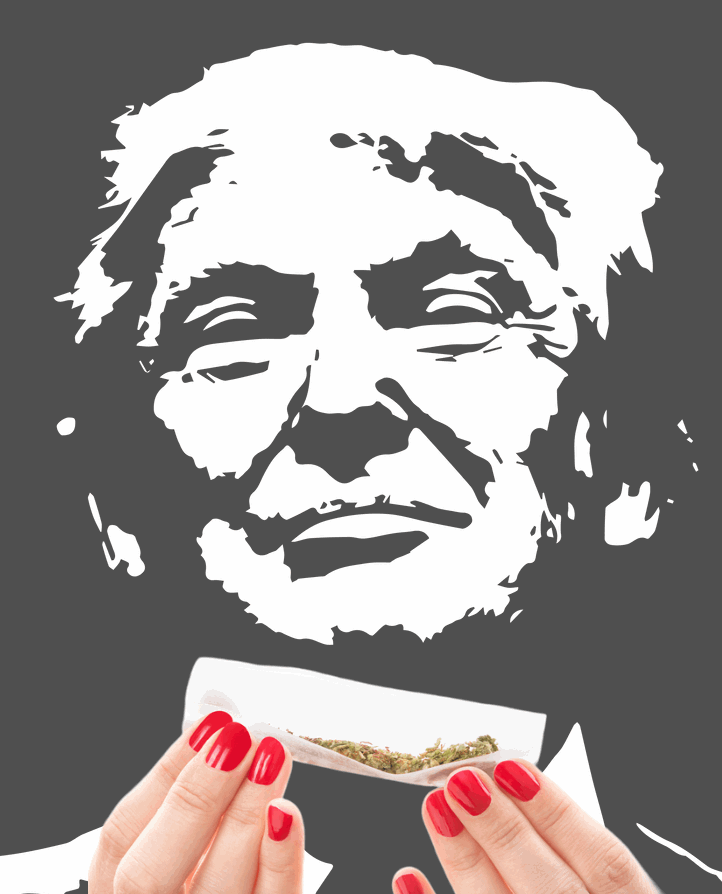

The Current Climate of Cannabis and international implications of Trump policies
Just when you thought the world of cannabis policy couldn’t get any stranger, we find ourselves in what feels like a political acid trip gone sideways. It’s been over a month since Trump reclaimed his seat in the spotlight, and while the apocalypse hasn’t arrived (yet), we’re witnessing some seriously mind-bending policy proposals that would make even Salvador Dalí question reality.
Picture this: Trump wants to rename the Gulf of Mexico (because apparently, geography needs a MAGA makeover), slap massive tariffs on our neighbors like he’s dealing cards at a high-stakes poker game, and has his sights set on everything from Greenland to the Panama Canal. It’s like watching a real-estate mogul play Risk with actual countries.
But here’s where things get particularly interesting for us cannabis enthusiasts: Trump’s declaration of drug cartels as terrorist organizations and his war cry to ramp up the War on Drugs in response to the fentanyl crisis. Now, I’ve been analyzing drug policy long enough to know that when politicians start throwing around terms like “terrorist” and “war on drugs” in the same sentence, we’re in for some interesting times.
As someone who’s watched the cannabis industry evolve from back-alley dealings to billion-dollar legitimate businesses, I can’t help but feel a sense of déjà vu mixed with genuine concern. Are we about to witness a dramatic shift in the progress we’ve made toward legalization? Will international cannabis trade become another casualty in this new era of aggressive foreign policy?
Today, I’m going to break down what Trump’s presidency might mean for cannabis policy, both domestically and internationally. Buckle up, folks – we’re in for a wild ride through the next four years, and if there’s one thing I’ve learned about cannabis policy, it’s that reality often proves stranger than fiction.
Let me tell you something about the War on Drugs that you won’t find in textbooks or policy papers. I lived in Mexico during the bloodiest period of its drug war, 2006-2012, and what I witnessed was far from the sanitized version most Americans hear about on their evening news.
While today’s headlines about shootouts in Culiacán might shock you, they pale in comparison to what happened during Calderón’s presidency. Imagine driving to work and seeing bodies hanging from highway overpasses, their lifeless forms swaying in the morning breeze – a grotesque warning to anyone who dared oppose the cartels. Decapitations weren’t just plot devices in cartel documentaries; they were a weekly occurrence in many cities.
The psychological terrorism was perhaps even worse than the physical violence. Picture this: you’re having dinner with your family at a nice restaurant, trying to maintain some semblance of normalcy, but there’s always that nagging fear in the back of your mind. At any moment, a drug lord and his heavily armed crew might walk in, confiscate everyone’s phones, and essentially hold you hostage while they enjoy their meal. Sure, they’d usually pay for everyone’s drinks – a twisted form of narco-courtesy – but the message was clear: they owned the streets, and by extension, they owned you.
For my American readers, I know the War on Drugs conjures images of militarized police raids and overcrowded prisons – and trust me, that’s bad enough. The U.S. version of this “war” was about turning citizens into state-owned slaves, filling private prisons with nonviolent offenders, and destroying communities, particularly communities of color. But the level of violence never reached the near-apocalyptic scenes I witnessed in Mexico and Colombia.
Now here’s where things get really concerning. Cannabis might be legal in many states today, with dispensaries replacing dealer’s numbers in our phones, but Trump’s recent move to label drug cartels as “terrorist organizations” is like throwing gasoline on a smoldering fire. This isn’t just semantic gymnastics – it’s a fundamental shift from a police action to a military operation.
Some of you might be thinking, “Good! Send in the military! That’ll show them!” Trust me, as someone who’s seen what happens when you militarize this conflict, that’s about as smart as using a flamethrower to kill a mosquito. It doesn’t just escalate the violence; it transforms entire regions into war zones where civilian casualties become “collateral damage” in an unwinnable war.
A few weeks ago, I was practically dancing in my home office when I heard RFK Jr. might be heading up Health and Human Services. Finally, I thought, someone who might bring a fresh perspective to national cannabis policy. But my enthusiasm went up in smoke faster than a joint at a Snoop Dogg concert when he announced he’d “defer to the DEA on marijuana rescheduling.” Talk about a buzzkill – we’re right back where we started.
Trump’s new Attorney General isn’t exactly Jeff “Good People Don’t Smoke Marijuana” Sessions 2.0, but let’s just say she won’t be joining your local NORML chapter anytime soon. However, there might be an unexpected opportunity hidden in this chaos. See, Trump seems laser-focused on fentanyl, with cannabis barely registering on his radar. But here’s where things get interesting – and complicated.
The cannabis industry is like a giant spider web, connecting Chinese triads, Mexican cartels, local farmers, legal operators, and everyone in between. We’ve got constitutional legalization in Canada and Mexico, plus more than half of U.S. states with some form of legal cannabis. It’s a complex ecosystem that’s about to get shaken up by Trump’s declaration of war on cartels.
Here’s the problem: as long as cannabis remains Schedule I, law enforcement will keep playing whack-a-mole with both legitimate and illegitimate operations. But while your local grow might have a security guard with a Glock, they’re not exactly rolling with military-grade weapons like the cartels. And let’s not kid ourselves – cartel influence runs deeper than most Americans realize. Hell, major banks have been caught laundering their money, proving that suits can be just as dirty as street dealers.
So how do we prevent Trump’s War on Fentanyl from turning into a bloodbath that engulfs the entire cannabis industry? There’s only one real solution: complete removal of cannabis from the Controlled Substances Act. Not rescheduling, not decriminalization – full federal legalization.
Think about it: Trump could strike a major blow against the cartels by legitimizing one of their biggest cash crops. When cannabis becomes as common as Budweiser, the cartels lose their ability to control the market. No more underground grows, no more smuggling operations, no more violence over territory – just good old-fashioned American capitalism.
But here’s the catch – this can only happen through Congress. The cannabis community needs to mobilize like never before, flooding representatives’ offices with calls, emails, and visits. We need to make it clear that federal legalization isn’t just about getting high; it’s about national security, economic opportunity, and ending a cycle of violence.
Is it a long shot? Sure. About as likely as finding seeds in top-shelf dispensary bud. But stranger things have happened in American politics, and sometimes the most unlikely scenarios create the perfect storm for change. Besides, what’s the alternative? Sitting back and watching as decades of progress potentially go up in smoke?
So dream big, my friends. Sometimes those impossible dreams are the only ones worth fighting for.
Let me be crystal clear about something: anyone thinking Mexico is going to be another Afghanistan clearly hasn’t been paying attention. While the U.S. military had a jolly old time “protecting” Afghan poppy fields (funny how that heroin epidemic exploded, right?), Mexico is an entirely different animal.
For starters, Mexico’s constitution predates the invention of the telegraph. Within this venerable document lies a crystal-clear message: foreign military operations on Mexican soil equal an act of war. Period. No asterisks, no fine print, no “but what if we’re really nice about it?” clause. This isn’t some far-flung territory where you can drum up WMD allegations – this is our next-door neighbor with deep international ties.
Speaking of ties, Mexico isn’t some isolated nation that the international community can conveniently ignore. We’re talking about a country with major investment deals with China, Europe, and pretty much every other significant player on the global stage. Any U.S. military action in Mexico would trigger an international crisis that would make the Cuban Missile Crisis look like a schoolyard spat.
So what can Trump actually do? He’s limited to border theatrics, training Mexican forces (because that worked so well with Los Zetas, right?), and supplying weapons. And here’s where it gets really dark: those same weapons will inevitably end up in cartel arsenals. It’s like trying to put out a fire by throwing gasoline-soaked rags at it – you’re just making the problem exponentially worse.
The result? Another bloodbath. Hundreds of thousands dead. And for what? The drugs won’t stop flowing – they never do. They’ll just get more expensive, forcing addicts into increasingly desperate measures to fund their habits. Theft, assault, kidnapping, murder – the whole ugly spiral of addiction-driven crime will accelerate. Your quiet suburban neighborhood won’t feel so safe anymore.
How can I be so certain? Because I’ve watched this same movie play out for over half a century. The War on Drugs is like a bad horror franchise – it keeps coming back with the same plot, just bloodier each time. There’s no victory scenario here, folks. This path only leads to more state control, less personal freedom, more danger, more addiction, and more death.
At this point, our best hope is that Trump’s tough talk is just another negotiating tactic – his trademark “Art of the Deal” approach to getting what he really wants. But if the man with the golden combover has his heart set on destruction, we might be entering one of the bloodiest chapters in North American history. The only winners will be the usual suspects: the war profiteers, the prison industrial complex, and those who feast on human misery.
Remember, we’ve seen this show before. The only difference is that this time, the stakes are higher and the consequences could be catastrophic. Let’s hope cooler heads prevail, because the alternative isn’t just bad – it’s apocalyptically stupid.
TRUMP ON CANNABIS, NOW WHAT, READ ON…
TRUMP IS A BUSINESS MAN, HE WILL LEGALIZE WEED FOR TAXES AND JOBS?

280E Tax Code Restrictions on Cannabis Companies Forever?- GOP Senators File Bill to Keep 280E No Matter What Happnes to Weed

Karma Koala Podcast 232: Taylor Loyden – Terrapin Legal, Managing Attorney – Psychedelics Will Change The Law But It’ll Be Glacial

Marijuana company involved in Missouri’s huge recall loses final license appeal

New Blueberry weed strains are about to make a wave

Not A Hopeless Case, If You Medicate with Cannabis

Could 2025 be the year of university and cannabis industry partnerships?

What Trump’s Cannabis Policy Means for America and the International Markets

Texas Hates Weed…Not! – 62% of Registered Voters Support Cannabis Legalization in the Lone Star State

Linked In Post – Jon Dennis, Psychedelic Lawyer: Washington SB 5201, the regulated psilocybin access bill, was considered today by the Senate Committee on Labor & Commerce ( 18 Feb 2025)

The rapid collapse of MedMen co-founders’ latest marijuana venture

Distressed Cannabis Business Takeaways – Canna Law Blog™

United States: Alex Malyshev And Melinda Fellner Discuss The Intersection Of Tax And Cannabis In New Video Series – Part VI: Licensing (Video)

What you Need to Know

Drug Testing for Marijuana – The Joint Blog

NCIA Write About Their Equity Scholarship Program

It has been a wild news week – here’s how CBD and weed can help you relax

Cannabis, alcohol firm SNDL loses CA$372.4 million in 2022

A new April 20 cannabis contest includes a $40,000 purse

Your Go-To Source for Cannabis Logos and Designs

UArizona launches online cannabis compliance online course
Trending
-

 Cannabis News2 years ago
Cannabis News2 years agoDistressed Cannabis Business Takeaways – Canna Law Blog™
-

 One-Hit Wonders2 years ago
One-Hit Wonders2 years agoUnited States: Alex Malyshev And Melinda Fellner Discuss The Intersection Of Tax And Cannabis In New Video Series – Part VI: Licensing (Video)
-

 Cannabis 1012 years ago
Cannabis 1012 years agoWhat you Need to Know
-

 drug testing1 year ago
drug testing1 year agoDrug Testing for Marijuana – The Joint Blog
-

 Education2 years ago
Education2 years agoNCIA Write About Their Equity Scholarship Program
-

 Cannabis2 years ago
Cannabis2 years agoIt has been a wild news week – here’s how CBD and weed can help you relax
-

 Marijuana Business Daily2 years ago
Marijuana Business Daily2 years agoCannabis, alcohol firm SNDL loses CA$372.4 million in 2022
-

 California2 years ago
California2 years agoA new April 20 cannabis contest includes a $40,000 purse





